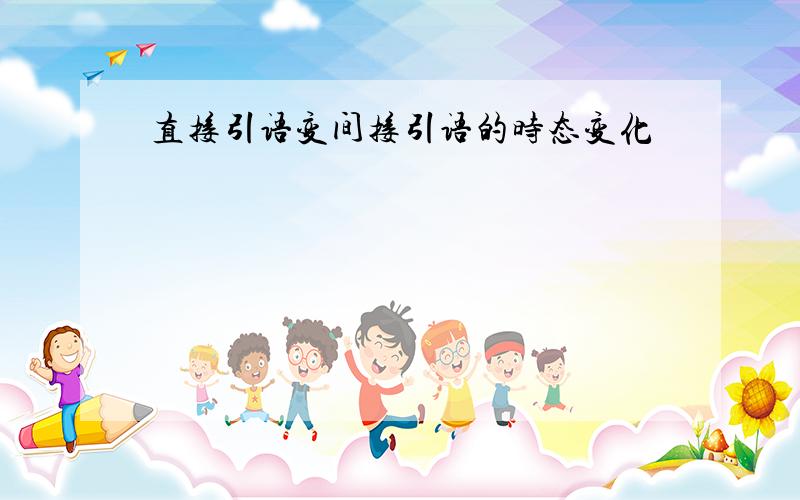直接引语变间接引语的时态变化
来源:学生作业帮 编辑:大师作文网作业帮 分类:英语作业 时间:2024/11/16 06:45:43
Chen Qiang told Mr Smith that the People's Republic of China____on October 1st,1949. A、founded B、had been founded C、found D、was founded

解题思路: 如下
解题过程:
Chen Qiang told Mr Smith that the People's Republic of China____on October 1st,1949.
A、founded B、had been founded C、found D、was founded
答案为D,found当成立讲,被动语态为be+过去分词。排除AC。其次根据下面第三点来判断。
直接引语变成间接引语时,从句时态无须改变的情况
1)当主句的谓语动词是一般现在时的时候,如:
He always says, “I am tired out.” ——>He always says that he is tired out.
2)当主句的谓语动词是将来时的时候,如:
He will say, “I’ll try my best to help you.” ——>He will say that he will try his best to help me.
3)当直接引语部分带有具体的过去时间状语时,如:
He said, “I went to college in 1994.” ——>He told us that he went to college in 1994.
4)当直接引语中有以when, while引导的从句,表示过去的时间时,如:
He said,“When I was a child, I usually played football after school.” ——>
He said that when he was a child, he usually played football after school.
5)当直接引语是客观真理或自然现象时,如:
Our teacher said to us, “Light travels faster than sound.” ——>
Our teacher told us that light travels faster than sound.
6)当引语是谚语、格言时,如:
He said,“Practice makes perfect.” ——>He said that practice makes perfect.
7)当直接引语中有情态动词should, would, could, had better, would rather, might, must, ought to, used to, need时,如:
例如:
The doctor said, “You'd better drink plenty of water.” ——>
The doctor said I'd better drink plenty of water.
He said, “She must be a teacher.”——> He said that she must be a teacher.
He said, “She ought to have arrived her office by now.”——>
He said that she ought to have arrived her office by then.
The teacher said, “You needn't hand in your compositions today.”——>
The teacher said we needn't/didn't need to/didn't have to hand in our compositions.
She asked, “Must I take the medicine?”——> She asked if she had to take the medicine.
同学你好,如有疑问请添加讨论。祝你学习进步。
最终答案:略
解题过程:
Chen Qiang told Mr Smith that the People's Republic of China____on October 1st,1949.
A、founded B、had been founded C、found D、was founded
答案为D,found当成立讲,被动语态为be+过去分词。排除AC。其次根据下面第三点来判断。
直接引语变成间接引语时,从句时态无须改变的情况
1)当主句的谓语动词是一般现在时的时候,如:
He always says, “I am tired out.” ——>He always says that he is tired out.
2)当主句的谓语动词是将来时的时候,如:
He will say, “I’ll try my best to help you.” ——>He will say that he will try his best to help me.
3)当直接引语部分带有具体的过去时间状语时,如:
He said, “I went to college in 1994.” ——>He told us that he went to college in 1994.
4)当直接引语中有以when, while引导的从句,表示过去的时间时,如:
He said,“When I was a child, I usually played football after school.” ——>
He said that when he was a child, he usually played football after school.
5)当直接引语是客观真理或自然现象时,如:
Our teacher said to us, “Light travels faster than sound.” ——>
Our teacher told us that light travels faster than sound.
6)当引语是谚语、格言时,如:
He said,“Practice makes perfect.” ——>He said that practice makes perfect.
7)当直接引语中有情态动词should, would, could, had better, would rather, might, must, ought to, used to, need时,如:
例如:
The doctor said, “You'd better drink plenty of water.” ——>
The doctor said I'd better drink plenty of water.
He said, “She must be a teacher.”——> He said that she must be a teacher.
He said, “She ought to have arrived her office by now.”——>
He said that she ought to have arrived her office by then.
The teacher said, “You needn't hand in your compositions today.”——>
The teacher said we needn't/didn't need to/didn't have to hand in our compositions.
She asked, “Must I take the medicine?”——> She asked if she had to take the medicine.
同学你好,如有疑问请添加讨论。祝你学习进步。
最终答案:略